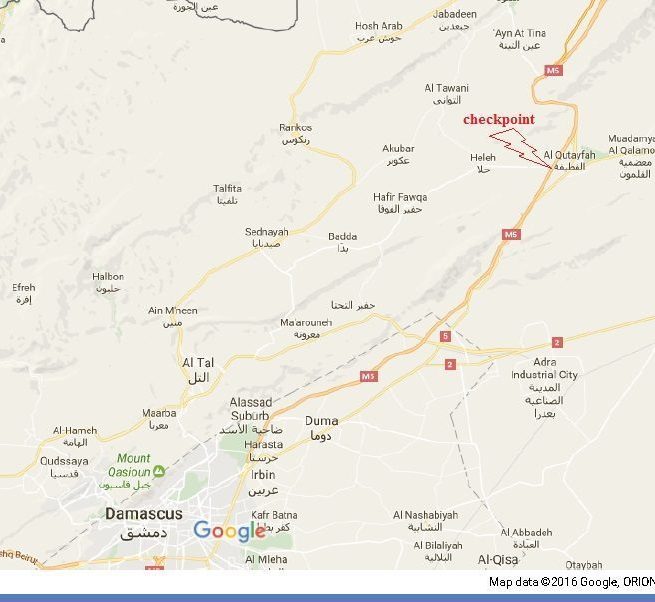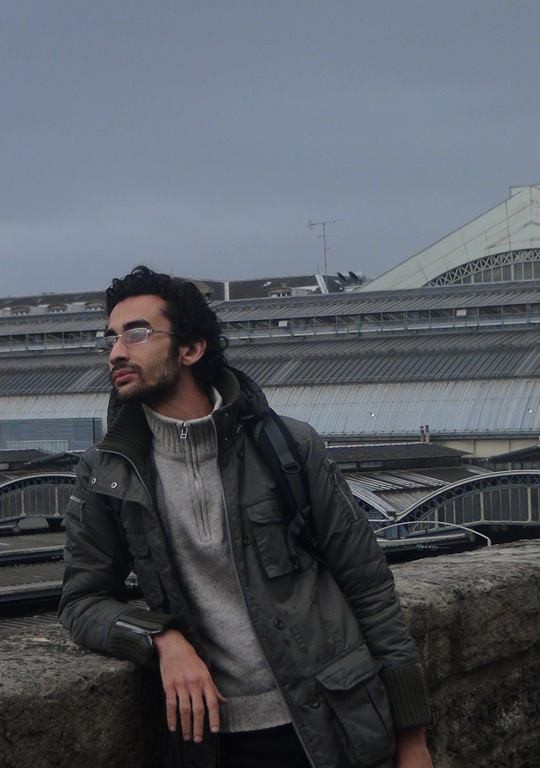In Syria, there is a checkpoint known by several names: the checkpoint of terror, of death, of fear. It differs from the rest of the checkpoints in Syria in that those who man it do not accept bribes and insist on thorough searches against their list of those wanted.
The names on the checkpoint's list are not on other wanted lists. This list includes every possible accusation: being oppositionists, terrorists, carrying arms, dodging mandatory service, weakening national morale, foreign collaboration, among others. The fear Syrians have of this checkpoint is reflective of the shadow of fear in which Syrians have spent their lives.

Al-Qutayfah checkpoint is located on the highway that links Damascus with northern Syria, at the entrance to al-Qutayfah city, 40 km from Damascus. South of the city lies the Third Division's 14th Regiment, one of the most powerful units within the Syrian army. 300 meters past the checkpoint towards the city are military barracks and housing.
Mohammad Hamidan, an officer who deserted the 14th Regiment in June 2012, spoke to SyriaUntold about the fear surrounding al-Qutayfah. “Whenever someone is arrested, they get their name at the checkpoint. Even if the person is released, they retain their name and will detain the individual if they cross the checkpoint.
“They even detain people if their name is similar to a name on the list. The detained are then taken to the Third Division’s headquarters, where people who have done nothing wrong confess to all sorts of crimes to escape torture.”
What makes al-Qutayfah peculiar is also that “officials from different intelligence branches are at the checkpoint, and they bring their own lists with them,” explained Hamidan, who now works for Orient News, an opposition TV channel.
As for the size of the personnel stationed in al-Qutayfah, the deserter commented: “You can say that this checkpoint has been transformed into an independent military outpost. In addition to the Third Division commander, about 300 officers are at the checkpoint.”
Stories of Fear, Detention and Death
The presence of this checkpoint means activists in Damascus cannot travel to the north out of fear of arrest. Ahmed Ayyub1, a 50-year-old leftist activist in Jaramana, Damascus, told SyriaUntold: “I haven’t been able to visit my parents in al-Mushrifah, a village in northern Homs, since 2012 because of the checkpoint at al-Qutayfah. I can pass through the checkpoints in Damascus easily but there is no guarantee for this checkpoint.”
The people of al-Qutayfah, however, do not have a choice. They have to pass through the checkpoint everyday if they work or study in the capital. Local sources informed SyriaUntold that, even if the guards became familiar with the people who pass through, they still inspect them in the same way. They ask for all the passengers of any car for identification, and check them against the lists, which takes about 15 minutes each time they pass by.
Many arrests have occurred at this checkpoint. SyriaUntold contacted witnesses, all of whom refused to speak about what they saw, either due to fear or residual trauma.
Saham al-Jandali , a young activist from Damascus and relief worker with internal displaced persons, said to SyriaUntold: “I can comment on any aspect of the Syrian uprising except for al-Qutayfah checkpoint. It reminds me of a number of tragedies, specifically the detention of my love who was arrested at the checkpoint for unknown reasons.
“It was 2014, and he was transferred to the Palestine intelligence branch. Months later, his family was told to pick up his body from al-Mujtahid Hospital in Damascus. He had been killed under torture.”
Indiscriminate detentions have led to a lot of anger against the checkpoint. In June 2016, a truck driver suspected of being affiliated with armed groups was allegedly asked to stop his car and go into the interrogation room for questioning. When he walked in, he detonated a grenade, killing himself and a number of Syrian army soldiers including Colonel Abdallah Ali of the 14th Regiment. Details surrounding this incident are still unclear.
Getting through the checkpoint requires some particularly laborious precautions. “When I travel, I contact activists who work in the regime institutions and ask if I’m ok to pass through the checkpoint,” said Rama Hasan, a filmmaker and feminist activist in Rif Dimashq.
“I travel with my friend who borrows the car from some security members who are sympathetic to the revolution, that way we can make it through all checkpoints easily, except for the al-Qutayfah checkpoint which still checks us and the car thoroughly,” continued Hasan.

Ammar al-Ahmad is a 28-year-old Tartusian medical student at Damascus University. In 2015, he was traveling from Damascus to Tartus when he passed through the al-Qutayfah checkpoint. One soldier got onto the bus and read his name out loud, asking him to step outside.
“I got out and asked him if there was a problem. He didn’t respond and told me to stand there and wait for a car to come take me,” said al-Ahmad.
It was only then that he realized that this could have something to do with him postponing military service. “I asked him if he wanted to see the official deferment documents,” continued the medical student, “the soldier then got an astonished look on his face and said: ʻOh, you postponed? Why didn’t you mention this right away? I was about to send you to serve into one of the military branches!'”
Most residents of Tartus are supporters of the regime and they’re usually allowed to pass through checkpoints.
However, this is not the case at Al-Qutayfah. In April 2014, Salim Ali, a 24-year-old fourth-year medical student, was returning from Tartous to Damascus “The soldier at the checkpoint asked for my identity card. I gave him my civilian ID as I am a civilian. But the soldier assumed I was another soldier pretending to be a civilian, and he took me into detention,” said Ali.
“I begged him, explaining that I was a university student, a civilian. For forty minutes, I was held until they confirmed that I wasn’t lying about my identity and that my ID card was real.”
Al-Qutayfah checkpoint strikes fear into the hearts of most Syrians, regardless of political orientation. It unites them in terror, a surreal paradox in the midst of a polarizing crisis.
[Main image: A Painting by Omran Faour (Omran Faour’s official Facebook page)].




